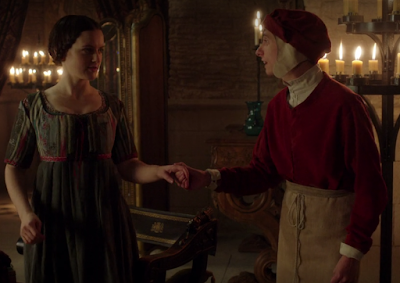Read the next entry here!
Conflicts continue along with the season, and one of the more notable guest stars on the series appears.
1.5, "Completely Mad...Alena"
Written by Casey Johnson, David Windsor, Jeremy hall, Luan Thomas, and Joe PiarulliDirected by John Fortenberry
Synopsis
 |
| Not all are unaware. Image taken from the episode, used for commentary. |
In Valencia, Richard anticipates Galavant's arrival. He explicates his nefarious intent to Gareth. Madalena intrudes, summoning her handmaiden, and said handmaiden and the king's chef confer. The latter attempts to woo the former, and Madalena rages against Richard's seeming inaction--in song.
 |
| With faces like these, other traditions are in play, as well. Image taken from the episode, used for commentary. |
Richard's cook finds himself the focus of Madalena's attentions. She presses on him for details of Richard's plans; she offers to send her handmaiden to him in exchange for information. He offers it to her.
At the appointed time, Richard awaits Galavant--who is late. Isabella arrives in his stead, working to bargain for Galavant's life. No change to the deal is available, however, and the plan proceeds, if with some delay. Galavant and Isabella begin to grow closer, as well.
Galavant, Isabella, and Sid infiltrate the Valencian castle. Isabella tries to intervene, but Richard intercedes and takes the three captive. He also reveals Isabella's perfidy.
The three find themselves incarcerated pending Galavant's execution. Galavant is led away to be hanged, but the cook is substituted for him; Madalena takes Galavant into her chambers to try to reclaim his affections as the episode comes to an end.
Discussion
Of some note in the episode is a possible reference to the less-known Thomas Hoccleve--specifically, his Complaint, in which his narrative persona confers with itself in a mirror. Hoccleve's conference seems to have a better end than Madalena's, but, owing to my work under Chris Healy at the University of Louisiana at Lafayette, the piece still comes to mind.A more prominent, recurring joke in the episode pertains to timekeeping. Several characters make reference to astronomical phenomena as they discuss when events will occur--followed by others, seemingly more pragmatic, confirming the times in modern chronology. Gareth's "So, like, nine o'clock" is an early example. Two things are going on in such interchanges. One is the nod towards the relative unavailability of reliable timekeeping in the medieval period. While it is the case that religious bodies tracked time--witness various liturgies of hours--and secular life did orient business around the religious bodies' notation of that time, the divisions were relatively broad. In the sparsely populated medievalist milieux of Galavant and other properties, many places are out of easy earshot of the bells usually used to mark such time in Western Christian communities; astronomical phenomena would then be the go-to reference points (and might even be when bells were available, as the motions of the heavens are more regular and reliable than personal timekeeping). Chaucer's Parson's Prologue makes such an equation, for but one example, using the height of the sun and the length of the narrator's shadow to assert the time (ll. 2-9).
The other is a long-standing trope of mocking those overly eloquent in their phrasing. (The irony of someone given to academic writing styles and lengthy asides making such a comment is not lost.) The florid, even turgid astronomical phrasings give way to concise clock-bound statements that seem meant to distill base information and tacitly to make fun of the former--and while such patterns proceed far back into the historical record, there are notable medieval instances of them that are commonly taught and so serve as reference points for many audiences. The Second Shepherds' Play, for example, notably (and to the delight of undergraduates and some lucky high schoolers) bids Mak "take outt that sothren tothe, / And sett in a torde!" (ll. 215-16), or to leave off fancy speech. Similarly, Chaucer's Parson gives a backhanded insult in his prologue, commenting with some aspersion on the "rum, ram, ruf" (l. 43) of more ornate presentation. Both seem good antecedents for a medievalist comedy series...


No comments:
Post a Comment